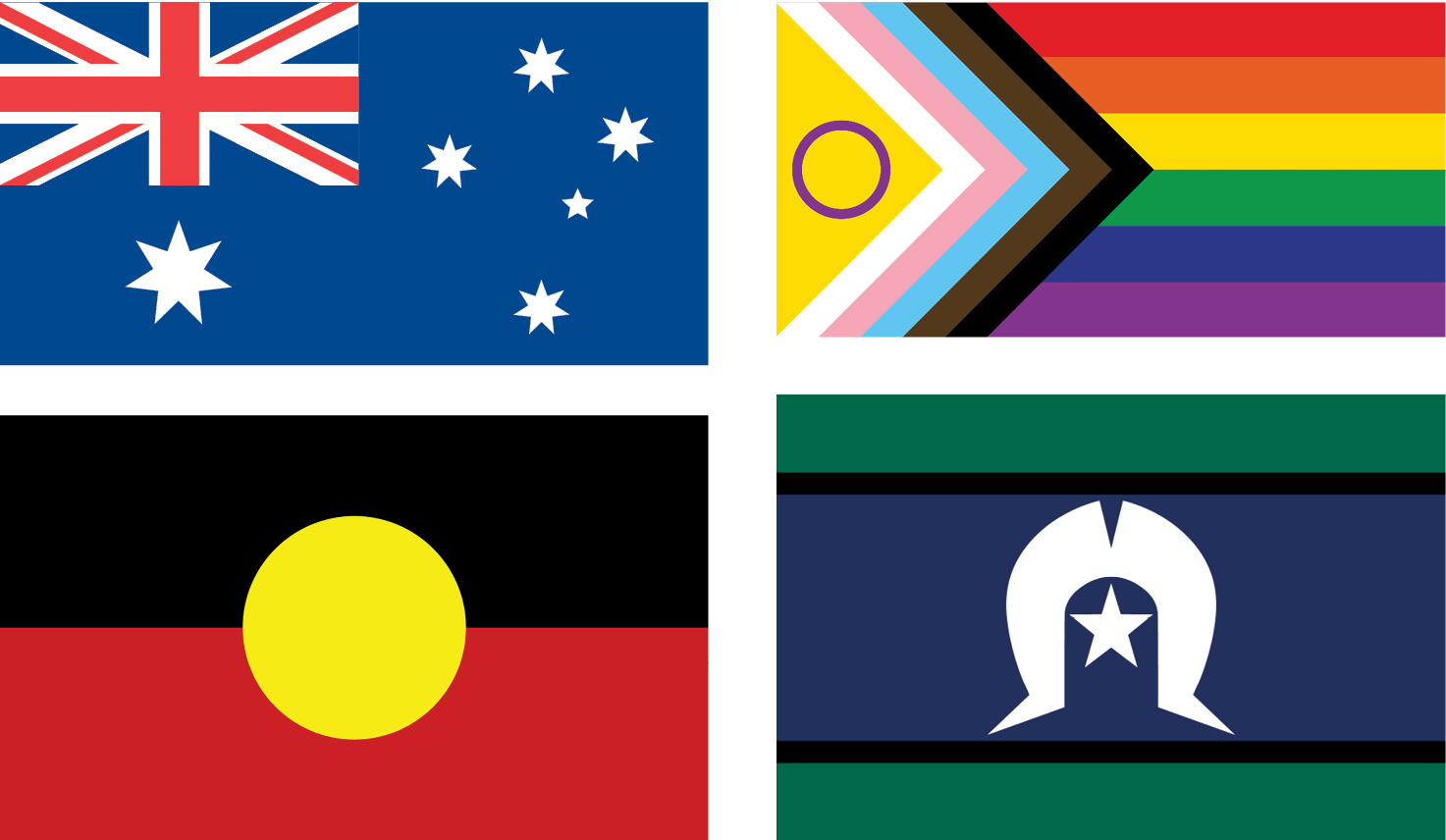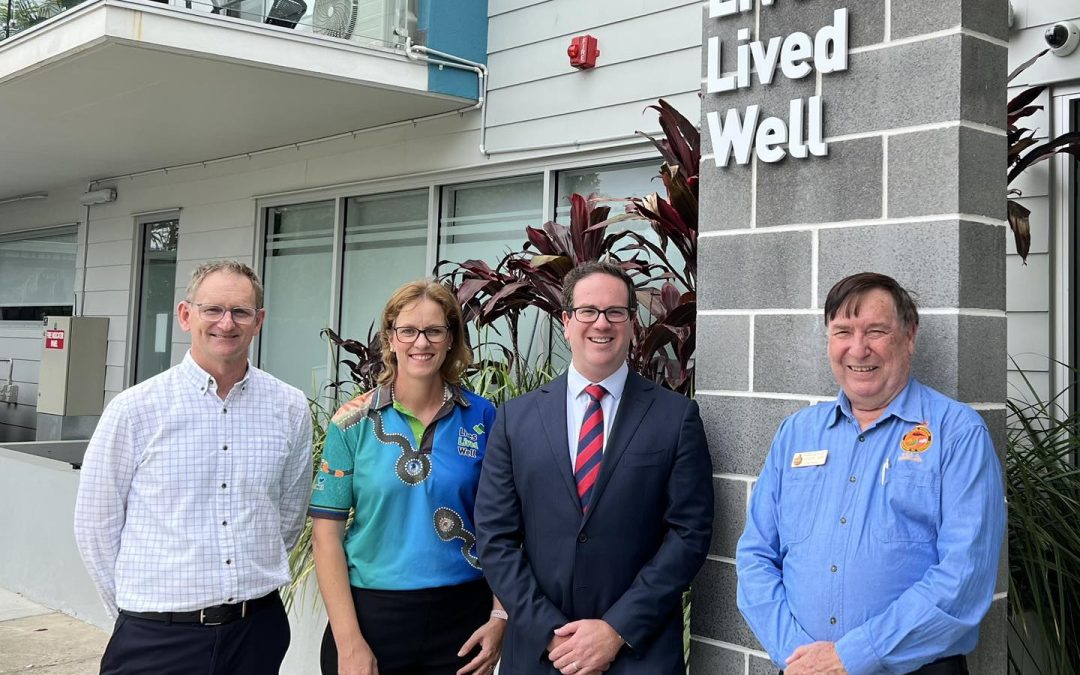
Feb 6, 2023
The Department of Veterans Affairs (DVA) has appointed Lives Lived Well to establish a new Veterans’ and Families’ Hub for Southeast Queensland.
The Hon. Matt Keogh, Minister for Veterans’ Affairs and Defence, visited Lives Lived Well’s Wunya Residential Rehabilitation service in January to announce the funding.
Minister for Veterans’ Affairs and Defence Personnel Matt Keogh said the Australian Government is delivering on its commitment to provide more localised support for Southeast Queensland’s defence and veteran communities. “I am pleased to announce that Lives Lived Well will establish the Southeast Queensland Veterans’ and Families’ Hub, bringing a new perspective to supporting veterans and families,” Minister Keogh said.
“For over 40 years Lives Lived Well have provided health and wellbeing support in Queensland and New South Wales, with extensive experience in working with individuals and families needing physical and mental health services and support with social connections.”
In partnership with the Vietnam Veterans Association of Australia (Queensland Branch) and Australian War Widows Queensland, Lives Lived Well will offer a dedicated, welcoming, confidential space for veterans and their families. Services provided will be flexible and tailored, offering possibilities for social connection and engagement and key supports that may include employment, housing, transition support, advocacy, mental health support and other counselling.
The Hub will act as a shopfront to provide simple and flexible access to relevant services. Our team will comprise Wellbeing Coordinators and people with lived experience of Veteran life to ensure anyone accessing the Hub is supported in a safe and understanding way.
Our team will work in partnership with Ex-Service Organisations (ESOs) and other key partners to help the Veteran or their family member to access services and support.
Wellbeing coordination will be delivered in-person, by phone and online to ensure flexibility and accessibility. Read more about the new Veterans’ and Families’ Hub.
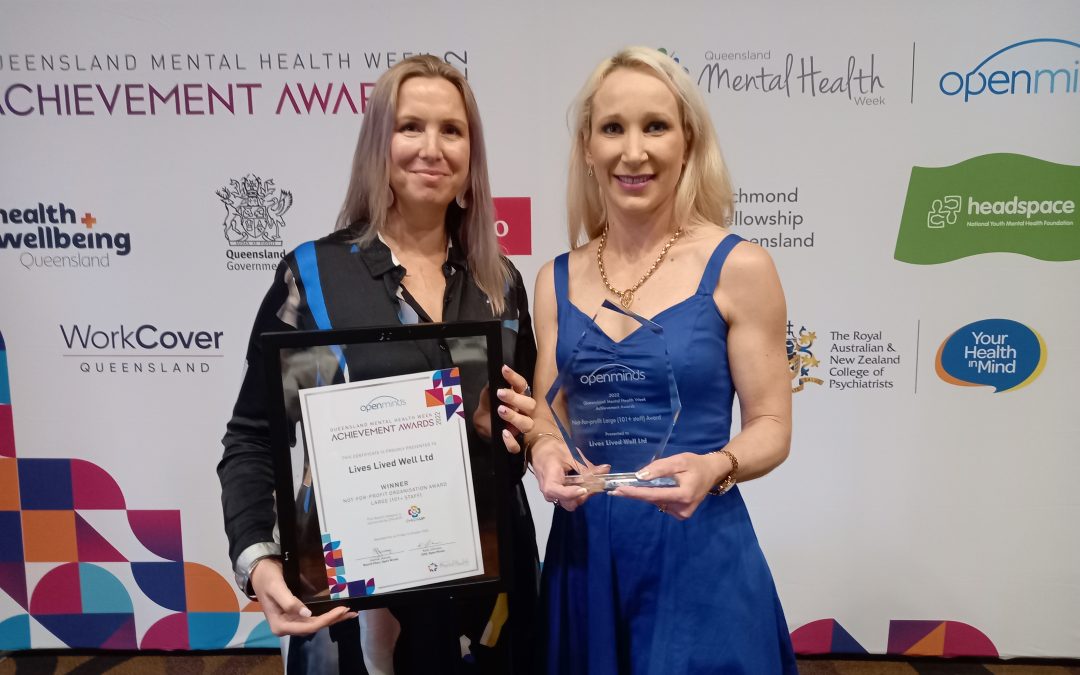
Jan 16, 2023
Lives Lived Well has been heartened to see our work recognised by our peers, with our organisation being named the recipient of a Queensland Mental Health Week Achievement Award in the large not-for-profit organisation (100+ staff) category on 14 October.
The award recognises mental health related services, programs, projects and initiatives that demonstrate a commitment to improving the quality of life of Queenslanders living with mental illness and promoting their inclusion in the broader community.
Lives Lived Well delivers a number of mental health support services – headspace Southport, headspace Upper Coomera, a NewAccess program on the Darling Downs/South Burnett and the Lighthouse service for young people on the Gold Coast.
The award acknowledged our shared commitment to collaborating and consulting with consumers, their families, carers, and other relevant agencies to deliver best practice services.
Lives Lived Well was in good company for the award, with Neami National and Youturn Youth Support Services also being nominated in this category.
Thanks to the award sponsors and organisers, Queensland Mental Health Commission, Open Minds and CheckUp Australia.
Learn more about our mental health support services.
For all media enquiries please contact:
Lives Lived Well Marketing team by emailing [email protected]
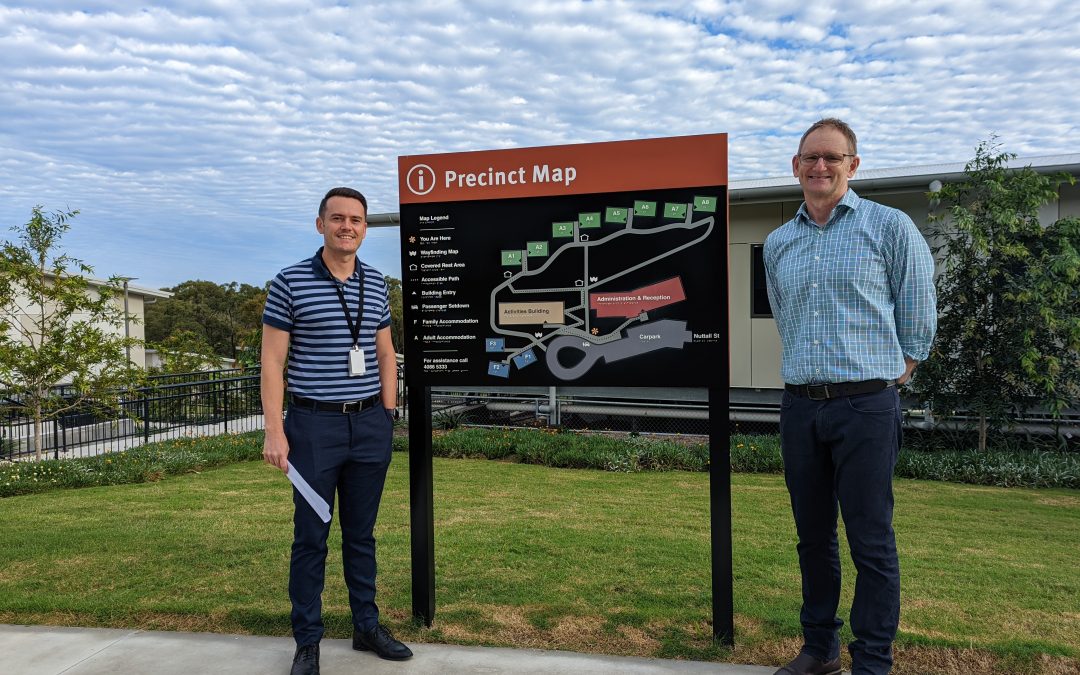
Dec 9, 2022
Problematic alcohol consumption is the most common concern for people seeking help at Central Queensland’s newest purpose-built live-in withdrawal and rehabilitation service, Binbi Yadubay – Healthy Beginnings.
The service celebrated its first birthday on 7 December and data from the first its 12 months of operation shows alcohol to be well ahead of methamphetamine and cannabis as the main drug of concern for Binbi Yadubay’s clients.
Around 46% of the people entering rehabilitation at Binbi Yadubay in the past 12 months sought support to address alcohol-related concerns, while 38% sought help for a problem with methamphetamine (ice) and 7% for cannabis.
Since its opening in 2021, the service has offered a ‘healthy beginning’ to 453 people and families from across the region, enabling them to address concerns related to alcohol and other drugs.
Owned by Queensland Health and operated by not-for-profit organisation Lives Lived Well, the service offers support to men and women aged 18+. Binbi Yadubay can also support families with young children, with two family units on site enabling parents to attend treatment while children are in childcare or at school.
Lives Lived Well’s Central Queensland Clinical Services Manager, Mikel Gellatly, said adults could access a safe and supported 24-hour environment to withdraw from alcohol or other drugs through Binbi Yadubay’s 8-bed Withdrawal Unit.
“The withdrawal program is delivered over 5-10 days and, in its first year, supported 118 people,” Mikel said. “On completion, clients can continue their recovery journey at the 32-bed rehabilitation service, located on the same site. In the past year, 233 people have accessed the live-in rehabilitation service.
“The age group we most commonly saw represented was 25-34 years (36%), while 33% of clients were aged between 35-44 years.
“Anecdotally, we know that problematic consumption of alcohol is a major issue across Australia, and our own client data certainly supports that,” he said.
Mikel said the team at Binbi Yadubay was looking forward to continuing to build an inclusive and welcoming service for the people of Central QLD.
“Our first year has been very positive. We already have some clients returning to volunteer with us – they have experienced life-changing support and want to give back.
“It’s incredibly motivating for our clients to meet people who have been through our treatment program and are now living their life well.”
Holistic recovery
While clients complete an evidence-informed treatment program that runs in cycles of six weeks, they also can participate in various programs and activities designed to support holistic treatment and recovery.
Clients can gain life skills, such as cooking, gardening and physical health, by participating in additional on-site activities.
“A lot of energy in our first year has gone into building relationships and networks with local groups and agencies so we can offer clients access to the support they need to address various interests and concerns,” Mikel said.
Mikel thanked the Central Queensland community for supporting Binbi Yadubay in its first year.
“People have been asking for this service for a long time, and thanks to the Queensland Government and Lives Lived Well, it’s now not just a reality. It’s part of the fabric of the community. Thank you to everyone who has helped bring the service to life.”
Lives Lived Well is a not-for-profit provider of drug, alcohol and mental health support services across QLD and NSW. Enquiries about Binbi Yadubay can be made by visiting www.liveslivedwell.org.au, emailing [email protected] or calling 1300 727 957.
Learn more about Binbi Yadubay.
For all media enquiries please contact:
Lives Lived Well Marketing team by emailing [email protected]
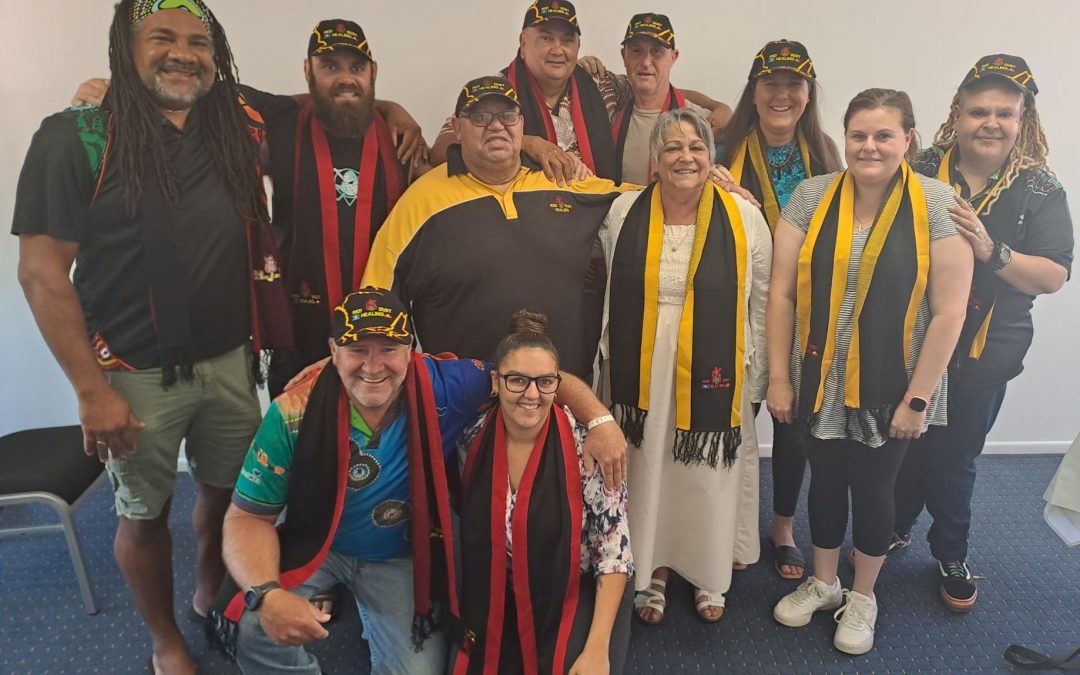
Nov 15, 2022
Twenty employees from across Lives Lived Well have been fortunate to complete the “transformative” Red Dust Healing program in 2022.
More than 17,000 people from across Australia have completed this week-long program since it started.
Red Dust Healing was designed from an Aboriginal perspective but the program is not just for Indigenous people, it is for all people. The program is targeted at the heart, not the head.
During the week, participants learn about rejection, grief and loss as the foundation of all hurt. They are encouraged to examine their own personal hurt. Through role play, participants are placed in the position of being hurt (victim) and then as the person doing the hurting (perpetrator).
The program identifies the emotions felt as the victim and then the hurt caused as the perpetrator.
Participants agreed they came away with a better understanding of the power of healing and how important this is for people on their recovery or healing journey.
The training was delivered by Wiradjuri man, Uncle Tom Powell. Uncle Tom created a safe space for all participants to share deeply personal insights. His combination of humility, warmth, gentleness, humour and acceptance made this training very powerful.
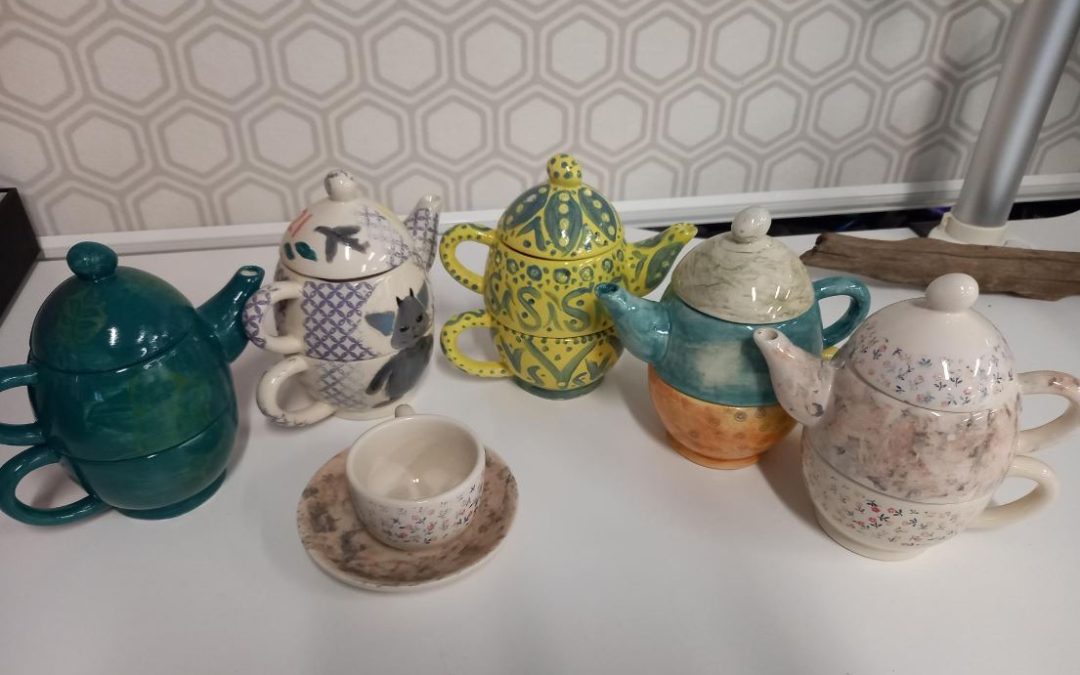
Oct 7, 2022
In October during Mental Health Week, headspace Southport’s Family Peer Support Worker Cate White facilitated a self-care group for families and carers of the headspace Early Psychosis Program.
“Cup of Kindness” was an opportunity for those who are providing care and support to a young person experiencing psychosis, to take some time out for themselves, get creative, have a chat and receive valuable support.
The group decorated their own ceramic teapot and mug and talked about how self-kindness is an essential part of sustaining yourself as a carer of someone who’s experiencing mental ill health.
Cate had the teapots and mugs all fired and finished just in time for World Kindness Day!
The previous self-care group run by Cate was candle-making, where participants discussed how to prevent burnout as a carer. Upcoming groups will include painting and other creative practices that allow time out, self -care and some well-earned escapism.
“Caring for yourself is the most selfless thing you can do when caring for others,” said Cate.
She has been running these quarterly self care groups for the past three years after receiving a grant and then demonstrating how and why they’re so valuable for our headspace Early Psychosis families.
Now they’re a permanent fixture in the Family Peer Support Program, alongside monthly support groups.





